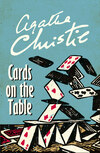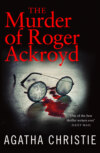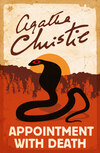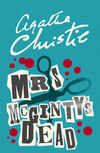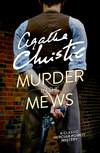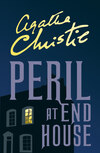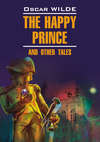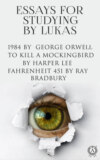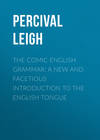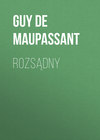Kitabı oku: «Cards on the Table», sayfa 2
CHAPTER 3
A Game of Bridge
When the company returned to the drawing-room a bridge table had been set out. Coffee was handed round.
‘Who plays bridge?’ asked Mr Shaitana. ‘Mrs Lorrimer, I know. And Dr Roberts. Do you play, Miss Meredith?’
‘Yes. I’m not frightfully good, though.’
‘Excellent. And Major Despard? Good. Supposing you four play here.’
‘Thank goodness there’s to be bridge,’ said Mrs Lorrimer in an aside to Poirot. ‘I’m one of the worst bridge fiends that ever lived. It’s growing on me. I simply will not go out to dinner now if there’s no bridge afterwards! I just fall asleep. I’m ashamed of myself, but there it is.’
They cut for partners. Mrs Lorrimer was partnered with Anne Meredith against Major Despard and Dr Roberts.
‘Women against men,’ said Mrs Lorrimer as she took her seat and began shuffling the cards in an expert manner. ‘The blue cards, don’t you think, partner? I’m a forcing two.’
‘Mind you win,’ said Mrs Oliver, her feminist feelings rising. ‘Show the men they can’t have it all their own way.’
‘They haven’t got a hope, the poor dears,’ said Dr Roberts cheerfully as he started shuffling the other pack. ‘Your deal, I think, Mrs Lorrimer.’
Major Despard sat down rather slowly. He was looking at Anne Meredith as though he had just made the discovery that she was remarkably pretty.
‘Cut, please,’ said Mrs Lorrimer impatiently. And with a start of apology he cut the pack she was presenting to him.
Mrs Lorrimer began to deal with a practised hand.
‘There is another bridge table in the other room,’ said Mr Shaitana.
He crossed to a second door and the other four followed him into a small comfortably furnished smoking-room where a second bridge table was set ready.
‘We must cut out,’ said Colonel Race.
Mr Shaitana shook his head.
‘I do not play,’ he said. ‘Bridge is not one of the games that amuse me.’
The others protested that they would much rather not play, but he overruled them firmly and in the end they sat down. Poirot and Mrs Oliver against Battle and Race.
Mr Shaitana watched them for a little while, smiled in a Mephistophelian manner as he observed on what hand Mrs Oliver declared Two No Trumps, and then went noiselessly through into the other room.
There they were well down to it, their faces serious, the bids coming quickly. ‘One heart.’ ‘Pass.’ ‘Three clubs.’ ‘Three spades.’ ‘Four diamonds.’ ‘Double.’ ‘Four hearts.’
Mr Shaitana stood watching a moment, smiling to himself.
Then he crossed the room and sat down in a big chair by the fireplace. A tray of drinks had been brought in and placed on an adjacent table. The firelight gleamed on the crystal stoppers.
Always an artist in lighting, Mr Shaitana had simulated the appearance of a merely firelit room. A small shaded lamp at his elbow gave him light to read by if he so desired. Discreet floodlighting gave the room a subdued look. A slightly stronger light shone over the bridge table, from whence the monotonous ejaculations continued.
‘One no trump’—clear and decisive—Mrs Lorrimer.
‘Three hearts’—an aggressive note in the voice—Dr Roberts.
‘No bid’—a quiet voice—Anne Meredith’s.
A slight pause always before Despard’s voice came. Not so much a slow thinker as a man who liked to be sure before he spoke.
‘Four hearts.’
‘Double.’
His face lit up by the flickering firelight, Mr Shaitana smiled.
He smiled and he went on smiling. His eyelids flickered a little…
His party was amusing him.
‘Five diamonds. Game and rubber,’ said Colonel Race. ‘Good for you, partner,’ he said to Poirot. ‘I didn’t think you’d do it. Lucky they didn’t lead a spade.’
‘Wouldn’t have made much difference, I expect,’ said Superintendent Battle, a man of gentle magnanimity.
He had called spades. His partner, Mrs Oliver, had had a spade, but ‘something had told her’ to lead a club—with disastrous results.
Colonel Race looked at his watch.
‘Ten-past-twelve. Time for another?’
‘You’ll excuse me,’ said Superintendent Battle. ‘But I’m by way of being an “early-to-bed” man.’
‘I, too,’ said Hercule Poirot.
‘We’d better add up,’ said Race.
The result of the evening’s five rubbers was an overwhelming victory for the male sex. Mrs Oliver had lost three pounds and seven shillings to the other three. The biggest winner was Colonel Race.
Mrs Oliver, though a bad bridge player, was a sporting loser. She paid up cheerfully.
‘Everything went wrong for me tonight,’ she said. ‘It is like that sometimes. I held the most beautiful cards yesterday. A hundred and fifty honours three times running.’
She rose and gathered up her embroidered evening bag, just refraining in time from stroking her hair off her brow.
‘I suppose our host is next door,’ she said.
She went through the communicating door, the others behind her.
Mr Shaitana was in his chair by the fire. The bridge players were absorbed in their game.
‘Double five clubs,’ Mrs Lorrimer was saying in her cool, incisive voice.
‘Five No Trumps.’
‘Double five No Trumps.’
Mrs Oliver came up to the bridge table. This was likely to be an exciting hand.
Superintendent Battle came with her.
Colonel Race went towards Mr Shaitana, Poirot behind him.
‘Got to be going, Shaitana,’ said Race.
Mr Shaitana did not answer. His head had fallen forward, and he seemed to be asleep. Race gave a momentary whimsical glance at Poirot and went a little nearer. Suddenly he uttered a muffled exclamation, bent forward. Poirot was beside him in a minute, he, too, looking where Colonel Race was pointing—something that might have been a particularly ornate shirt stud—but was not…
Poirot bent, raised one of Mr Shaitana’s hands, then let it fall. He met Race’s inquiring glance and nodded. The latter raised his voice.
‘Superintendent Battle, just a minute.’
The superintendent came over to them. Mrs Oliver continued to watch the play of Five No Trumps doubled.
Superintendent Battle, despite his appearance of stolidity, was a very quick man. His eyebrows went up and he said in a low voice as he joined them:
‘Something wrong?’
With a nod Colonel Race indicated the silent figure in the chair.
As Battle bent over it, Poirot looked thoughtfully at what he could see of Mr Shaitana’s face. Rather a silly face it looked now, the mouth drooping open—the devilish expression lacking…
Hercule Poirot shook his head.
Superintendent Battle straightened himself. He had examined, without touching, the thing which looked like an extra stud in Mr Shaitana’s shirt—and it was not an extra stud. He had raised the limp hand and let it fall.
Now he stood up, unemotional, capable, soldierly—prepared to take charge efficiently of the situation.
‘Just a minute, please,’ he said.
And the raised voice was his official voice, so different that all the heads at the bridge table turned to him, and Anne Meredith’s hand remained poised over an ace of spades in dummy.
‘I’m sorry to tell you all,’ he said, ‘that our host, Mr Shaitana, is dead.’
Mrs Lorrimer and Dr Roberts rose to their feet. Despard stared and frowned. Anne Meredith gave a little gasp.
‘Are you sure, man?’
Dr Roberts, his professional instincts aroused, came briskly across the floor with a bounding medical ‘in-at-the-death’ step.
Without seeming to, the bulk of Superintendent Battle impeded his progress.
‘Just a minute, Dr Roberts. Can you tell me first who’s been in and out of this room this evening?’
Roberts stared at him.
‘In and out? I don’t understand you. Nobody has.’
The superintendent transferred his gaze.
‘Is that right, Mrs Lorrimer?’
‘Quite right.’
‘Not the butler nor any of the servants?’
‘No. The butler brought in that tray as we sat down to bridge. He has not been in since.’
Superintendent Battle looked at Despard.
Despard nodded in agreement.
Anne said rather breathlessly, ‘Yes—yes, that’s right.’
‘What’s all this, man,’ said Roberts impatiently. ‘Just let me examine him; may be just a fainting fit.’
‘It isn’t a fainting fit, and I’m sorry—but nobody’s going to touch him until the divisional surgeon comes. Mr Shaitana’s been murdered, ladies and gentlemen.’
‘Murdered?’ A horrified incredulous sigh from Anne.
A stare—a very blank stare—from Despard.
A sharp incisive ‘Murdered?’ from Mrs Lorrimer.
A ‘Good God!’ from Dr Roberts.
Superintendent Battle nodded his head slowly. He looked rather like a Chinese porcelain mandarin. His expression was quite blank.
‘Stabbed,’ he said. ‘That’s the way of it. Stabbed.’
Then he shot out a question:
‘Any of you leave the bridge table during the evening?’
He saw four expressions break up—waver. He saw fear—comprehension—indignation—dismay—horror; but he saw nothing definitely helpful.
‘Well?’
There was a pause, and then Major Despard said quietly (he had risen now and was standing like a soldier on parade, his narrow, intelligent face turned to Battle):
‘I think every one of us, at one time or another, moved from the bridge table—either to get drinks or to put wood on the fire. I did both. When I went to the fire Shaitana was asleep in the chair.’
‘Asleep?’
‘I thought so—yes.’
‘He may have been,’ said Battle. ‘Or he may have been dead then. We’ll go into that presently. I’ll ask you now to go into the room next door.’ He turned to the quiet figure at his elbow: ‘Colonel Race, perhaps you’ll go with them?’
Race gave a quick nod of comprehension.
‘Right, Superintendent.’
The four bridge players went slowly through the doorway.
Mrs Oliver sat down in a chair at the far end of the room and began to sob quietly.
Battle took up the telephone receiver and spoke. Then he said:
‘The local police will be round immediately. Orders from headquarters are that I’m to take on the case. Divisional surgeon will be here almost at once. How long should you say he’d been dead, M. Poirot? I’d say well over an hour myself.’
‘I agree. Alas, that one cannot be more exact—that one cannot say, “This man has been dead one hour, twenty-five minutes and forty seconds.”’
Battle nodded absently.
‘He was sitting right in front of the fire. That makes a slight difference. Over an hour—not more than two and a half: that’s what our doctor will say, I’ll be bound. And nobody heard anything and nobody saw anything. Amazing! What a desperate chance to take. He might have cried out.’
‘But he did not. The murderer’s luck held. As you say, mon ami, it was a very desperate business.’
‘Any idea, M. Poirot, as to motive? Anything of that kind?’
Poirot said slowly:
‘Yes, I have something to say on that score. Tell me, M. Shaitana—he did not give you any hint of what kind of a party you were coming to tonight?’
Superintendent Battle looked at him curiously.
‘No, M. Poirot. He didn’t say anything at all. Why?’
A bell whirred in the distance and a knocker was plied.
‘That’s our people,’ said Superintendent Battle. ‘I’ll go and let ’em in. We’ll have your story presently. Must get on with the routine work.’
Poirot nodded.
Battle left the room.
Mrs Oliver continued to sob.
Poirot went over to the bridge table. Without touching anything, he examined the scores. He shook his head once or twice.
‘The stupid little man! Oh, the stupid little man,’ murmured Hercule Poirot. ‘To dress up as the devil and try to frighten people. Quel enfantillage!’
The door opened. The divisional surgeon came in, bag in hand. He was followed by the divisional inspector, talking to Battle. A camera man came next. There was a constable in the hall.
The routine of the detection of crime had begun.
CHAPTER 4
First Murderer?
Hercule Poirot, Mrs Oliver, Colonel Race and Superintendent Battle sat round the dining-room table.
It was an hour later. The body had been examined, photographed and removed. A fingerprint expert had been and gone.
Superintendent Battle looked at Poirot.
‘Before I have those four in, I want to hear what you’ve got to tell me. According to you there was something behind this party tonight?’
Very deliberately and carefully Poirot retold the conversation he had held with Shaitana at Wessex House.
Superintendent Battle pursed his lips. He very nearly whistled.
‘Exhibits—eh? Murderers all alive oh! And you think he meant it? You don’t think he was pulling your leg?’
Poirot shook his head.
‘Oh, no, he meant it. Shaitana was a man who prided himself on his Mephistophelian attitude to life. He was a man of great vanity. He was also a stupid man—that is why he is dead.’
‘I get you,’ said Superintendent Battle, following things out in his mind. ‘A party of eight and himself. Four “sleuths”, so to speak—and four murderers!’
‘It’s impossible!’ cried Mrs Oliver. ‘Absolutely impossible. None of those people can be criminals.’
Superintendent Battle shook his head thoughtfully.
‘I wouldn’t be so sure of that, Mrs Oliver. Murderers look and behave very much like everybody else. Nice, quiet, well-behaved, reasonable folk very often.’
‘In that case, it’s Dr Roberts,’ said Mrs Oliver firmly. ‘I felt instinctively that there was something wrong with that man as soon as I saw him. My instincts never lie.’
Battle turned to Colonel Race.
‘What do you think, sir?’
Race shrugged his shoulders. He took the question as referring to Poirot’s statement and not to Mrs Oliver’s suspicions.
‘It could be,’ he said. ‘It could be. It shows that Shaitana was right in one case at least! After all, he can only have suspected that these people were murderers—he can’t have been sure. He may have been right in all four cases, he may have been right in only one case—but he was right in one case; his death proved that.’
‘One of them got the wind up. Think that’s it, M. Poirot?’
Poirot nodded.
‘The late Mr Shaitana had a reputation,’ he said. ‘He had a dangerous sense of humour, and was reputed to be merciless. The victim thought that Shaitana was giving himself an evening’s amusement, leading up to a moment when he’d hand the victim over to the police—you! He (or she) must have thought that Shaitana had definite evidence.’
‘Had he?’
Poirot shrugged his shoulders.
‘That we shall never know.’
‘Dr Roberts!’ repeated Mrs Oliver firmly. ‘Such a hearty man. Murderers are often hearty—as a disguise! If I were you, Superintendent Battle, I should arrest him at once.’
‘I dare say we would if there was a Woman at the Head of Scotland Yard,’ said Superintendent Battle, a momentary twinkle showing in his unemotional eye. ‘But, you see, mere men being in charge, we’ve got to be careful. We’ve got to get there slowly.’
‘Oh, men—men,’ sighed Mrs Oliver, and began to compose newspaper articles in her head.
‘Better have them in now,’ said Superintendent Battle. ‘It won’t do to keep them hanging about too long.’
Colonel Race half rose.
‘If you’d like us to go—’
Superintendent Battle hesitated a minute as he caught Mrs Oliver’s eloquent eye. He was well aware of Colonel Race’s official position, and Poirot had worked with the police on many occasions. For Mrs Oliver to remain was decidedly stretching a point. But Battle was a kindly man. He remembered that Mrs Oliver had lost three pounds and seven shillings at bridge, and that she had been a cheerful loser.
‘You can all stay,’ he said, ‘as far as I’m concerned. But no interruptions, please (he looked at Mrs Oliver), and there mustn’t be a hint of what M. Poirot has just told us. That was Shaitana’s little secret, and to all intents and purposes it died with him. Understand?’
‘Perfectly,’ said Mrs Oliver.
Battle strode to the door and called the constable who was on duty in the hall.
‘Go to the little smoking-room. You’ll find Anderson there with four guests. Ask Dr Roberts if he’ll be so good as to step this way.’
‘I should have kept him to the end,’ said Mrs Oliver. ‘In a book, I mean,’ she added apologetically.
‘Real life’s a bit different,’ said Battle.
‘I know,’ said Mrs Oliver. ‘Badly constructed.’
Dr Roberts entered with the springiness of his step slightly subdued.
‘I say, Battle,’ he said. ‘This is the devil of a business! Excuse me, Mrs Oliver, but it is. Professionally speaking, I could hardly have believed it! To stab a man with three other people a few yards away.’ He shook his head. ‘Whew! I wouldn’t like to have done it!’ A slight smile twitched up the corners of his mouth. ‘What can I say or do to convince you that I didn’t do it?’
‘Well, there’s motive, Dr Roberts.’
The doctor nodded his head emphatically.
‘That’s all clear. I hadn’t the shadow of a motive for doing away with poor Shaitana. I didn’t even know him very well. He amused me—he was such a fantastic fellow. Touch of the Oriental about him. Naturally, you’ll investigate my relations with him closely—I expect that. I’m not a fool. But you won’t find anything. I’d no reason for killing Shaitana, and I didn’t kill him.’
Superintendent Battle nodded woodenly.
‘That’s all right, Dr Roberts. I’ve got to investigate as you know. You’re a sensible man. Now, can you tell me anything about the other three people?’
‘I’m afraid I don’t know very much. Despard and Miss Meredith I met for the first time tonight. I knew of Despard before—read his travel book, and a jolly good yarn it is.’
‘Did you know that he and Mr Shaitana were acquainted?’
‘No. Shaitana never mentioned him to me. As I say, I’d heard of him, but never met him. Miss Meredith I’ve never seen before. Mrs Lorrimer I know slightly.’
‘What do you know about her?’
Roberts shrugged his shoulders.
‘She’s a widow. Moderately well off. Intelligent, well-bred woman—first-class bridge player. That’s where I’ve met her, as a matter of fact—playing bridge.’
‘And Mr Shaitana never mentioned her, either?’
‘No.’
‘H’m—that doesn’t help us much. Now, Dr Roberts, perhaps you’ll be so kind as to tax your memory carefully and tell me how often you yourself left your seat at the bridge table, and all you can remember about the movements of the others.’
Dr Roberts took a few minutes to think.
‘It’s difficult,’ he said frankly. ‘I can remember my own movements, more or less. I got up three times—that is, on three occasions when I was dummy I left my seat and made myself useful. Once I went over and put wood on the fire. Once I brought drinks to the two ladies. Once I poured out a whisky and soda for myself.’
‘Can you remember the times?’
‘I could only say very roughly. We began to play about nine-thirty, I imagine. I should say it was about an hour later that I stoked the fire, quite a short time after that I fetched the drinks (next hand but one, I think), and perhaps half-past eleven when I got myself a whisky and soda—but those times are quite approximate. I couldn’t answer for their being correct.’
‘The table with the drinks was beyond Mr Shaitana’s chair?’
‘Yes. That’s to say, I passed quite near him three times.’
‘And each time, to the best of your belief, he was asleep?’
‘That’s what I thought the first time. The second time I didn’t even look at him. Third time I rather fancy the thought just passed through my mind: “How the beggar does sleep.” But I didn’t really look closely at him.’
‘Very good. Now, when did your fellow-players leave their seats?’
Dr Roberts frowned.
‘Difficult—very difficult. Despard went and fetched an extra ash-tray, I think. And he went for a drink. That was before me, for I remember he asked me if I’d have one, and I said I wasn’t quite ready.’
‘And the ladies?’
‘Mrs Lorrimer went over to the fire once. Poked it, I think. I rather fancy she spoke to Shaitana, but I don’t know. I was playing a rather tricky no trump at the time.’
‘And Miss Meredith?’
‘She certainly left the table once. Came round and looked at my hand—I was her partner at the time. Then she looked at the other people’s hands, and then she wandered round the room. I don’t know what she was doing exactly. I wasn’t paying attention.’
Superintendent Battle said thoughtfully:
‘As you were sitting at the bridge table, no one’s chair was directly facing the fireplace?’
‘No, sort of sideways on, and there was a big cabinet between—Chinese piece, very handsome. I can see, of course, that it would be perfectly possible to stab the old boy. After all, when you’re playing bridge, you’re playing bridge. You’re not looking round you, and noticing what is going on. The only person who’s likely to be doing that is dummy. And in this case—’
‘In this case, undoubtedly, dummy was the murderer,’ said Superintendent Battle.
‘All the same,’ said Dr Roberts, ‘it wanted nerve, you know. After all, who is to say that somebody won’t look up just at the critical moment?’
‘Yes,’ said Battle. ‘It was a big risk. The motive must have been a strong one. I wish we knew what it was,’ he added with unblushing mendacity.
‘You’ll find out, I expect,’ said Roberts. ‘You’ll go through his papers, and all that sort of thing. There will probably be a clue.’
‘We’ll hope so,’ said Superintendent Battle gloomily.
He shot a keen glance at the other.
‘I wonder if you’d oblige me, Dr Roberts, by giving me a personal opinion—as man to man.’
‘Certainly.’
‘Which do you fancy yourself of the three?’
Dr Roberts shrugged his shoulders.
‘That’s easy. Off-hand, I’d say Despard. The man’s got plenty of nerve; he’s used to a dangerous life where you’ve got to act quickly. He wouldn’t mind taking a risk. It doesn’t seem to me likely the women are in on this. Take a bit of strength, I should imagine.’
‘Not so much as you might think. Take a look at this.’
Rather like a conjurer, Battle suddenly produced a long thin instrument of gleaming metal with a small round jewelled head.
Dr Roberts leaned forward, took it, and examined it with rich professional appreciation. He tried the point and whistled.
‘What a tool! What a tool! Absolutely made for murder, this little boy. Go in like butter—absolutely like butter. Brought it with him, I suppose.’
‘No. It was Mr Shaitana’s. It lay on the table near the door with a good many other knick-knacks.’
‘So the murderer helped himself. A bit of luck finding a tool like that.’
‘Well, that’s one way of looking at it,’ said Battle slowly.
‘Well, of course, it wasn’t luck for Shaitana, poor fellow.’
‘I didn’t mean that, Dr Roberts. I meant that there was another angle of looking at the business. It occurs to me that it was noticing this weapon that put the idea of murder into our criminal’s mind.’
‘You mean it was a sudden inspiration—that the murder wasn’t premeditated? He conceived the idea after he got here? Er—anything to suggest that idea to you?’
He glanced at him searchingly.
‘It’s just an idea,’ said Superintendent Battle stolidly.
‘Well, it might be so, of course,’ said Dr Roberts slowly.
Superintendent Battle cleared his throat.
‘Well, I won’t keep you any longer, doctor. Thank you for your help. Perhaps you’ll leave your address.’
‘Certainly. 200 Gloucester Terrace, W.2. Telephone No. Bayswater 23896.’
‘Thank you. I may have to call upon you shortly.’
‘Delighted to see you any time. Hope there won’t be too much in the papers. I don’t want my nervous patients upset.’
Superintendent Battle looked round at Poirot.
‘Excuse me, M. Poirot. If you’d like to ask any questions, I’m sure the doctor wouldn’t mind.’
‘Of course not. Of course not. Great admirer of yours, M. Poirot. Little grey cells—order and method. I know all about it. I feel sure you’ll think of something most intriguing to ask me.’
Hercule Poirot spread out his hands in his most foreign manner.
‘No, no. I just like to get all the details clear in my mind. For instance, how many rubbers did you play?’
‘Three,’ said Roberts promptly. ‘We’d got to one game all, in the fourth rubber, when you came in.’
‘And who played with who?’
‘First rubber, Despard and I against the ladies. They beat us, God bless ’em. Walk over; we never held a card.
‘Second rubber, Miss Meredith and I against Despard and Mrs Lorrimer. Third rubber, Mrs Lorrimer and I against Miss Meredith and Despard. We cut each time, but it worked out like a pivot. Fourth rubber, Miss Meredith and I again.’
‘Who won and who lost?’
‘Mrs Lorrimer won every rubber. Miss Meredith won the first and lost the next two. I was a bit up and Miss Meredith and Despard must have been down.’
Poirot said, smiling, ‘The good superintendent has asked you your opinion of your companions as candidates for murder. I now ask you for your opinion of them as bridge players.’
‘Mrs Lorrimer’s first class,’ Dr Roberts replied promptly. ‘I’ll bet she makes a good income a year out of bridge. Despard’s a good player, too—what I call a sound player—long-headed chap. Miss Meredith you might describe as quite a safe player. She doesn’t make mistakes, but she isn’t brilliant.’
‘And you yourself, doctor?’
Roberts’ eyes twinkled.
‘I overcall my hand a bit, or so they say. But I’ve always found it pays.’
Poirot smiled.
Dr Roberts rose.
‘Anything more?’
Poirot shook his head.
‘Well, goodnight, then. Goodnight, Mrs Oliver. You ought to get some copy out of this. Better than your untraceable poisons, eh?’
Dr Roberts left the room, his bearing springy once more. Mrs Oliver said bitterly as the door closed behind him:
‘Copy! Copy indeed! People are so unintelligent. I could invent a better murder any day than anything real. I’m never at a loss for a plot. And the people who read my books like untraceable poisons!’
